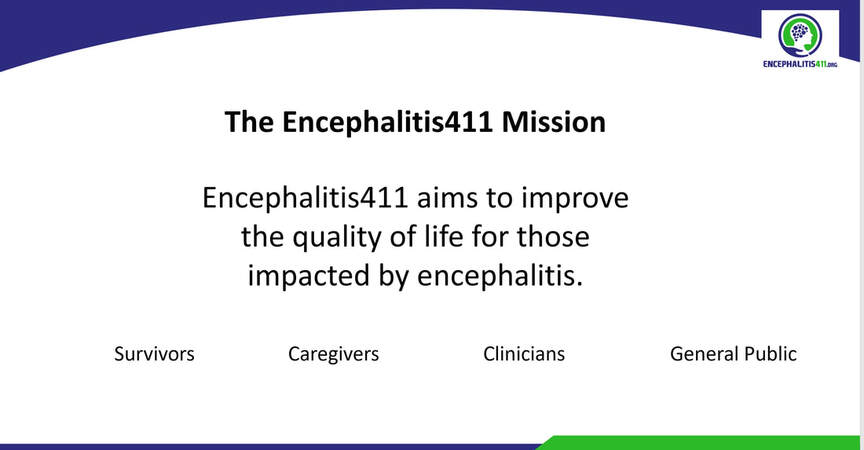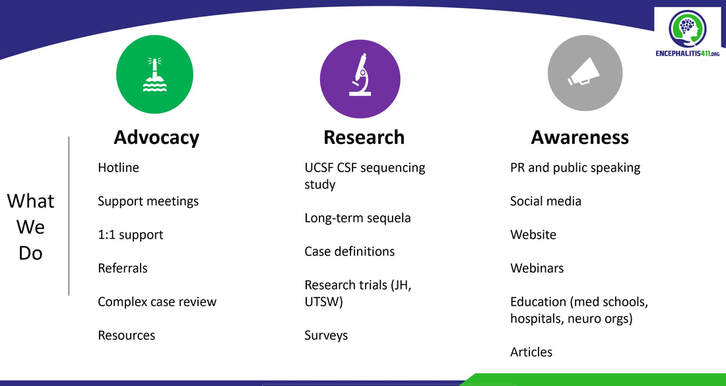Encephalitis411 mission
This mission statement was revised about 50 times because we wanted it to include survivors, caregivers, the medical system, medical schools, insurers, and any other entity that touches the lives of encephalitis patients. We felt this summarized the unifying purpose and cornerstone of our work: improving the wellbeing of all lives touched by this devastating illness. This applies not just to encephalitis survivors but also to anyone who comes in contact with them, including their family and friends.
our 3-pronged approach
Our work centers around research, awareness, and advocacy. With this 3-pronged approach, we aim to fulfill an unmet need for those impacted by encephalitis across the U.S.
Research: This can come in several forms—anything from funding medical research, to recruiting for clinical trials, to surveying the needs of the patient/caregiver community, to consulting on the development of studies with healthcare institutions, to conceptualizing projects directly with researchers.
Given the difficulty of diagnosis and treatment yet high potential for reversibility and healing, it is critically important for the community to work together to accelerate the pace of research. Encephalitis411 has funded research and contributed to projects with our medical faculty (including our latest collaboration with Dr. Michael Wilson of UCSF—details forthcoming), but we have ambitious goals to expand our impact in this area. We have the expert research network capable of execution and a community of active patients, caregivers, and survivors who are eager to participate. But our primary bottleneck is funding. With your contribution today you can make a difference.
Given the difficulty of diagnosis and treatment yet high potential for reversibility and healing, it is critically important for the community to work together to accelerate the pace of research. Encephalitis411 has funded research and contributed to projects with our medical faculty (including our latest collaboration with Dr. Michael Wilson of UCSF—details forthcoming), but we have ambitious goals to expand our impact in this area. We have the expert research network capable of execution and a community of active patients, caregivers, and survivors who are eager to participate. But our primary bottleneck is funding. With your contribution today you can make a difference.
Awareness: This includes outreach such as connecting treating physicians with our expert medical faculty for guidance, hosting events, organizing fundraisers, running social media campaigns, and speaking to civic groups, hospitals, and medical schools. We helped co-found the World Encephalitis Day Alliance and are very active in promoting activities and awareness around World Encephalitis Day (February 22nd).
One area we are urgently working on is raising awareness amongst “first responders,” meaning the healthcare professionals that act as the first point of contact for encephalitis patients at symptom onset. This includes primary care physicians, psychiatrists, ER doctors, and urgent care facility staff. If we can get an audience, we will speak. Let us know if you have an opportunity you wish to explore with us.
One area we are urgently working on is raising awareness amongst “first responders,” meaning the healthcare professionals that act as the first point of contact for encephalitis patients at symptom onset. This includes primary care physicians, psychiatrists, ER doctors, and urgent care facility staff. If we can get an audience, we will speak. Let us know if you have an opportunity you wish to explore with us.
Advocacy: This is nearest and dearest to our hearts. With encephalitis as rare, under-recognized, and misunderstood as it is, there has historically been a wide chasm between patients/caregivers who need help, medical professionals who have limited experience with this patient population, and well-meaning friends and family who lack the background to grasp the far-reaching impacts of the illness. We work to bridge that gap and empower the community to achieve the best possible outcomes.
We regularly host educational events with targeted programming depending on the audience. But perhaps the greatest area of need is 1-on-1 guidance—for patients, caregivers, and treating physicians alike. Our support hotline has been contacted by hundreds of people over the years, who are often in urgent need of support and insight from someone with an intimate understanding of encephalitis. This service would not be possible without the dedication of our team and generous donations from you.
We regularly host educational events with targeted programming depending on the audience. But perhaps the greatest area of need is 1-on-1 guidance—for patients, caregivers, and treating physicians alike. Our support hotline has been contacted by hundreds of people over the years, who are often in urgent need of support and insight from someone with an intimate understanding of encephalitis. This service would not be possible without the dedication of our team and generous donations from you.
our goals
Our volunteers, staff, board of directors, and medical faculty work tirelessly towards achieving the following goals:
- To provide reliable information and resources
- To connect survivors and engage them in a supportive community
- To support treating physicians in navigating the diagnosis and treatment of patients
- To fund, conduct, and collaborate on medical research that improves patient outcomes
- To educate insurers on the needs of encephalitis patients and advocate for increased coverage for necessary services
- To work together with other related non-profits towards common goals for the encephalitis community
- To work together with medical programs to elevate awareness and improve education of medical professionals


